- Home
- Sharyn McCrumb
The Unquiet Grave Page 8
The Unquiet Grave Read online
Page 8
A couple of weeks went by, and we didn’t hear from them. I wasn’t too surprised by that—after all, they were newlyweds, and he had a steady job six days a week, which kept them tied close to home. Zona must have had her hands full cooking and keeping house all by herself, too. A spell of winter weather set in about then, and with so many miles between them in the Richlands and us in Meadow Bluff, I didn’t think they’d care to brave the journey in an open buckboard. You can’t always tell what the weather will be in one end of the county when you’re looking at it from the other. No sense trying to visit if you might catch your death of cold from attempting it.
I did think they might come to see us around Christmastime—not that we made much of a to-do about it. Jacob or one of the older boys would cut a pine tree from up in the woods, and the younger ones and I would decorate it with paper chains and popcorn. On Christmas morning there might be an orange or a stick of penny candy and a handmade toy for the little ones, and not much else, but still, you expect the family to gather around for Christmas dinner. Jacob’s brother Johnson and his family came over in the afternoon, but we saw neither hide nor hair of Zona and Edward Shue.
I’d thought that after a couple of weeks had passed, Zona would be eager to show off her new husband, or at least she’d be bored at being shut up in her house day after day cooking and cleaning, while Edward—she insisted on calling him Trout, but I never would—was working at the smithy.
Nobody in the family was much for letter writing, either, so I hadn’t expected any long accounts of married life from Zona. I did get a postcard, though, in mid-December. All it said was, “We won’t come for Christmas. I have been ill. The doctor here is seeing to me. But I will try to come visit if I can while Trout is working one day. Love to all, E. Z. Shue.”
I was still mulling over that message at supper that night, and finally, when I could stand it no longer, I made up my mind to see for myself, else I’d never get another night’s rest for worrying. “Will you be needing the wagon every day next week, Jacob?”
He shook his head. “I can’t think of any reason I would, unless you’re wanting us to lay in more firewood. And even that wouldn’t take more’n a day at most. Why?”
“I wasn’t thinking about firewood. I was wanting to send H. C. over to the Richlands to fetch Zona back here for a visit.”
“Fetch her back?” He looked up from his plate, a piece of ham dangling from his fork. “Why? Did Zona ask to come?”
“No, but we had a card from her. She says she’s ailing. I thought I’d better see what’s the matter with her.”
“Well, if she’s feeling poorly, I don’t think that an all-day journey in an open wagon in December is likely to help her any, do you?”
Jacob was right; I knew it as soon as he said it.
I didn’t say anything, but he could tell I was still fretting about it, so finally he said, “If you’re that set on seeing her, you could go over to their house. I could take you over there myself, Mary Jane.”
I thought about it. We could work it so we arrived after Trout Shue had gone to the smithy, for I remembered how set he was on not having any company until he had the house fixed up like he wanted it, which was likely to be never, knowing Zona’s slapdash notions of housekeeping. Still, I didn’t want to be the cause of ructions between husband and wife, and he would surely find out if we had paid a visit. I was content to stay out of his way, but I did need to know what was wrong with my daughter.
“H. C. can take me, Jacob, if you can mind the young’uns and the chickens while we’re gone, for we’ll have to leave mighty early. I’ll write back to Zona, and tell her I’ll be visiting with Sarah next week, and bringing her a cooked dinner for the two of them. From what Zona told me, John and Sarah don’t live more than a couple of miles from Edward’s place at Livesay’s Mill. We can have her home before he’s done at work, and send dinner back with her. The promise of fried chicken and pie ought to persuade him to let her come for a visit with her kinfolks. I wish I knew what was the matter with her, though.”
Jacob nodded. “Woman’s troubles? Do you reckon there’s a baby on the way?”
I shook my head. “I don’t think so. I wish I did.”
H. C. is nearly sixteen, and just as much help around the place as a grown man, so I had no qualms about letting him drive the wagon when we went to fetch his older sister. I had written a postcard to Cousin Sarah, telling her to expect me for a quick visit next week, and a letter back to Zona, telling her to be ready on the Tuesday to come visit at her cousins’ house, where I’d be visiting for the day. H. C. would fetch her from home, I said, bidding her make sure that Trout knew she’d be bringing him back a good dinner when she returned. I was careful not to allow time for her to reply back to us before the day we were going to visit. That lessened the chances of a refusal.
H. C. and I were fortunate in our choice of the day for travel. We left early, when the morning mist was still wreathed around the trees and over the fields like a down quilt, but after the sun got high enough, it turned out to be one of those bright clear days in mid-December when the weather is unseasonably mild. In these mountains, winter doesn’t usually bind us in snow and ice until after the New Year anyway, and sometimes you do get December days that are warm as mid-October. I made H. C. wear his coat and scarf anyway, for you never know how the winds will change over the course of the day, but it looked to stay sunny and pleasant all day, and I expect he was as glad as I was of the change from being shut in on the farm doing the usual round of chores.
“Now, when you go to fetch your sister, you be sure you can tell me what that house is like, H. C. I hope she lets you see inside, but you don’t have much time to linger if we’re to make the trip there and back home in one day.”
H. C. wrinkled his nose. “What kind of things do you want to know?”
“Oh, just how it looks inside. If they’ve got curtains up yet, and what furniture is there. Is it heated well enough, and is Zona keeping up with her household chores.”
H. C. sighed. “I’m not a great one for noticing things like that—unless she’s got a dead horse in the parlor—but I’ll do my best. Reckon you’d do better to wait and ask Zona herself when I’ve fetched her.”
If she’ll tell me the truth, I thought. We rode on at a steady clip through most of the morning, and the road was clear and dry, so we had no trouble in our travels. I kept my coat bundled up around me and my knitted gloves on—it wouldn’t do for me to catch a chill and fall sick with so many folks at home to cook for and clean up after. I don’t suppose I was very good company for H. C. on the journey to the Richlands because I was too preoccupied worrying about Zona—not just her illness but also the peculiar fellow she had married in such haste.
We got to my cousins’ house just as the sun had finished burning away the mists. I was a Robinson before I married Jacob, and when my daddy got here from England in 1840, he wed Miss Jemima Brown from over in Virginia. Sarah was kin to me on my mama’s side of the family, and I never knew any of Daddy’s people, as they all stayed back across the ocean. I saw little enough of Sarah these days, since we stayed over in the Little Sewell area, so I was glad of a chance to see her, too, but my thoughts were mostly centered around Zona.
I didn’t do much more than hug Cousin Sarah and bid her how-do before I sent H. C. off again in the wagon to fetch his sister from Livesay’s Mill.
“And don’t take no for an answer!” I told him. “It’s just a short trip from there, and the weather is fine. Their house should be easy enough to find. You know how to get to Livesay’s Mill, don’t you?”
H. C. sighed. “Sure, I do. There’s just the one road through there, and if I was to have trouble finding Zona’s place, I reckon I could stop somewhere nearby and ask.”
“That’s fine, son.” I leaned in close to hug him, and said softly in his ear, so that my cousin wouldn’t overhear me, “Just don’t ask for directions at James Crookshanks’s smithy. I don’t want
to give that peculiar husband of hers a chance to forbid her to go.”
H. C. hitched up the reins, and the cart clattered off in the direction of Livesay’s Mill. I followed Sarah back inside the house to visit a spell while we waited. She settled me down in the parlor next to the fireplace, and brought steaming mugs of coffee and some fresh-baked pumpkin bread.
Then she sat down in the oak rocker on the other side of the hearth, and took out her sewing to keep busy while we talked. While we ate, we talked about the weather, and the ailments of her various elderly relatives, but my mind was on my own family troubles, and I could scarcely keep up my end of the conversation.
“What do you hear from Zona?” I asked her. “I came because I had a postcard the other day, saying that she had taken sick.”
She glanced up from her needlework and shook her head. “Mary Jane, I have not caught so much as a glimpse of those two since the wedding. You’d think they were in Texas instead of just a ways down the road.”
“It hasn’t been that many weeks, I suppose. Newlyweds and all.”
“Long enough, I would have thought.” Sarah sniffed, jabbing the needle into the shirt she was mending. “They haven’t turned up here at church, and they aren’t encouraging visitors, either. Leastways, he’s not. I sent my John over with a fresh-baked custard pie a couple of days after the wedding, and that new husband of Zona’s opened the door a crack, thanked John for the pie, and all but slammed the door in his face. He said he thought he saw Zona peeping out of one of the windows, but it was gathering dark, so he wasn’t sure.”
“I tell myself they’re just lovebirds wanting to be left alone.”
We looked at each other.
“Well, I hope I never have cause to feel guilty over the fact that she met him while she was staying with us, Mary Jane.”
“You can’t change what the Lord intended, Sarah,” I told her.
“They are a handsome pair, I’ll say that for them. She puts me in mind of you at that age. Let them live in one another’s pockets all winter. I expect they’ll be glad of other company come spring. She may be well along with a baby by then. Do you think that’s the trouble with her now?”
“I hope it is.”
We had never told the Richlands kinfolk about the Woldridge baby, and I knew that Zona was too downy a bird to confide in anyone when she was visiting here. Least said, soonest mended. I saw no reason to talk about it now, either; that part of Zona’s life was over and done with, and that baby was in a good home and well out of whatever situation she had got herself into now. I remembered that Edward Shue had not shown any interest in his own daughter by that first wife of his, and I could not think that he would have been a kind stepfather to a child of Zona’s—more likely it would have stopped their courtship in its tracks. I wish that thought had occurred to me sooner, but there’s no profit in trying to second-guess fate. They might be as contented as any other married couple, for all I knew, and if they weren’t it still wasn’t my business to prevent their union. As Jacob had said, Let her go.
seven
LAKIN, WEST VIRGINIA
1930
“You want the story of my life, Doctor? Why should I give it to you? Are you writing a book about your adventures among the mad?”
The young man shook his head. “It’s early days for that. In fact, I don’t know that I ever will.”
The patients had finished their evening meal, and instead of returning to his cell like the others, Gardner had been escorted by an attendant back to the now-empty parlor, where he found Dr. Boozer waiting for him in a wing chair next to the double windows. An identical chair had been set facing it, and the doctor motioned for him to be seated.
Gardner eased into the worn old chair and looked inquiringly at his host. “I suppose brandy and cigars are out of the question?”
Boozer laughed. “I’m afraid so. I couldn’t even persuade the cooks to let me have a pot of coffee to bring in here. The staff here doesn’t rate new doctors much higher than patients. Anyhow, all I can offer you is the dubious pleasure of my company and my undivided attention. I thought you might not mind sitting here where we can admire the view, such as it is. If you’re agreeable to it, you can chat with me for a bit instead of returning to your quarters.”
The lawyer considered it. “Have I the power to refuse you, Doctor?”
“You do, Mr. Gardner. There aren’t many things in this facility that are optional, but this is one of them.”
“I’ve no objection to talking to you, but I’ve a mind to draw up a contract so that you cannot profit by publishing any tale of mine.”
“I’m not proposing to be your biographer, Mr. Gardner. I’m just passing the time of day with you. It seems to me that time is something you have an abundance of just now.”
Gardner was gazing out the window, at the green lawn that sloped down to the now empty road. Somewhere beyond those trees lay the river. “I’m not much of a chatting man, Doctor, but over the years I have learned to feign being sociable. It is a requirement in my profession—and the one I find most difficult to practice. I doubt, though, that you are being sociable. You are currently practicing your own profession, are you not?”
“I wouldn’t put it as formally as that.” Boozer made an open-handed gesture, a concession that the other man had seen through him. “I like talking to people. I’m trying to get to know you, to see if there’s some way I can help you. The more I know about you, the more likely it is that I’ll be able to.”
Gardner raised his eyebrows. “The medical equivalent of the third degree?”
Boozer smiled. “Hardly that. Most patients wouldn’t have any idea what to confess to, because they don’t think there’s anything wrong with them. Or to put it another way, they think they are reacting normally given the circumstances.”
“How so?”
“Well, to use a classic example: Killing your child may be a terrible thing to do, and it is certainly against the law. But if you sincerely believe that God has commanded you to do it, then if you carry out His instructions you are acting in a reasonable manner.”
“That’s the biblical story of Abraham.”
“Yes, but there’s a woman patient here who would tell you exactly the same thing if you asked her why she murdered her baby.”
“I think Abraham was crazy like a fox. He didn’t sacrifice his son, remember. At the last minute, he claimed that God agreed to settle for a ram instead, so he slit its throat instead of Isaac’s.”
“Yes. Unfortunately, God hasn’t been so accommodating lately. At least, not to the patients I’ve treated. Nobody stopped them from killing a loved one.”
“It would be an interesting defense, though. Saying that the Lord commanded you to kill. Put that argument to a God-fearing jury—”
“Well, I wouldn’t bet on an acquittal, Mr. Gardner. They just might charge the Almighty as an accessory before the fact.”
The two men laughed at that, the first real accord between them.
“No, I don’t suppose I could win the case,” Gardner conceded. “If the defendant claims that God commanded the act, and twelve jurors refuse to believe it, the matter is settled right there. In the law, it isn’t so much the truth that matters; it’s the consensus.”
“That’s how it works here, too. It isn’t what the patient believes that constitutes reality; it’s what the physicians believe.”
“So, I suppose it is the patient’s task to convince the doctors of the truth in his claims?”
“Or you could agree with the doctor’s point of view. That’s generally quicker.”
“Tell me what to say, then.”
James Boozer sighed, and rubbed the fine trace of stubble along the angle of his jaw. “I’m trying to help you really get well, not just pretend to get well. And to do that I need to hear your side of it. There is a new idea going about in medical circles that talking might be a useful tool in treating mental patients. I have wanted to try it. I don’t know that I e
ntirely agree with the theory. Some of the poor folks here are too far gone for it to work, I think. At least, I doubt my ability to reach them. But you are an educated man, not prone to violence, and I thought we might have a go at it. Surely you’d prefer such a treatment to the traditional alternatives.”
“What would those alternatives be?”
“Unpleasant ones.” Boozer shrugged. “You’ve probably heard about them. Being restrained and left in a tub of cold water for the better part of a day. Electrical shocks. Doing violence to the body in attempt to gain the attention of the mind. My colleagues swear that these methods work—at least sometimes.”
Gardner’s smile was grim. “If your victim has any control at all over his faculties, I believe he would feign sanity simply in order to escape such horrors. I know I would.”
“Now there’s rational thought.” Boozer nodded encouragingly. “So I propose that we simply talk together every day or so, and see if that accomplishes anything. If, after a reasonable time, it doesn’t, then my colleagues here can always resort to the conventional means of treating insanity.”
Gardner inclined his head. “A threat, but handsomely stated. I see no alternative but to cooperate. Earlier you asked about the circumstances of my commitment.”
“I looked it up in your file, actually.”
“I thought you would have. It seemed the logical course of action. So why ask me?”
“Because the file doesn’t list reasons, only behaviors. And you seem eminently rational, so I thought that perhaps, you being a lawyer working in the South, you really are sane, and that maybe some of the local white attorneys might have railroaded you in here to get rid of you.”
The old man stared at the Northern doctor for a long minute, and then he began to laugh. “I diagnose paranoia, Doctor. Lock yourself in a padded cell.”
Boozer shuffled some papers to cover his discomfiture. “Well, you hear about such things . . .”
Mr. Gardner gave him a pitying smile. “Now why would my fellow lawyers in Mercer County bother to get rid of me? My clients were mostly colored and mostly poor—even before the economic disaster this country is sliding into. Sometimes I’d take my fee in smoked ham or by having my grass mowed—do you think the white attorneys envy me that? And if I wasn’t around to represent those poor folks, then like as not the judge would appoint one of my more prosperous colleagues to defend them pro bono. Conspire to get me put away? Why, faced with the prospect of working extra hours for canned tomatoes, they might just come over here and help me to escape if I were to ask them to, not on my account but to save themselves the bother of attending to my clients.”

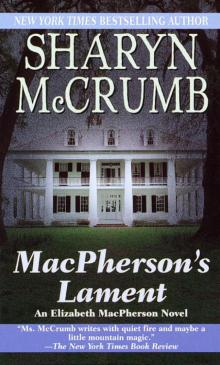 Elizabeth MacPherson 07 - MacPherson’s Lament
Elizabeth MacPherson 07 - MacPherson’s Lament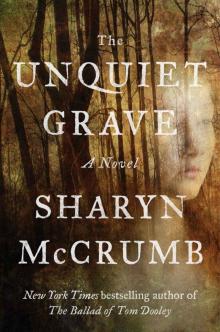 The Unquiet Grave: A Novel
The Unquiet Grave: A Novel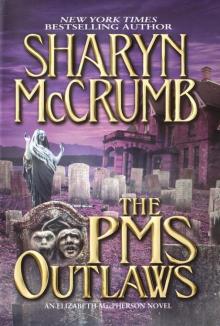 The PMS Outlaws: An Elizabeth MacPherson Novel
The PMS Outlaws: An Elizabeth MacPherson Novel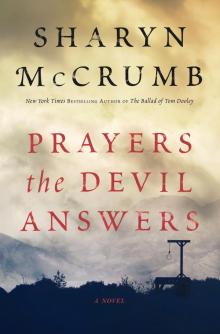 Prayers the Devil Answers
Prayers the Devil Answers Paying the Piper
Paying the Piper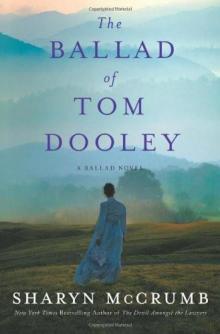 The Ballad of Tom Dooley: A Ballad Novel
The Ballad of Tom Dooley: A Ballad Novel Highland Laddie Gone
Highland Laddie Gone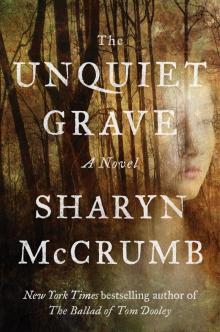 The Unquiet Grave
The Unquiet Grave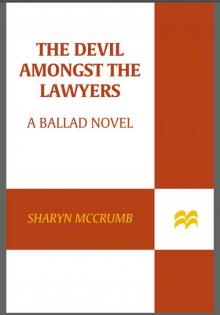 The Devil Amongst the Lawyers
The Devil Amongst the Lawyers The Windsor Knot
The Windsor Knot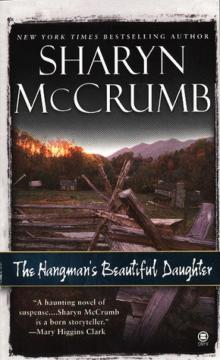 The Hangman's Beautiful Daughter
The Hangman's Beautiful Daughter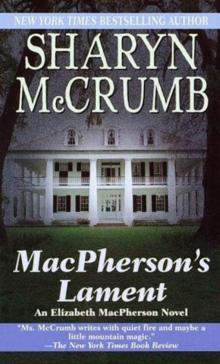 MacPherson's Lament
MacPherson's Lament The Ballad of Tom Dooley
The Ballad of Tom Dooley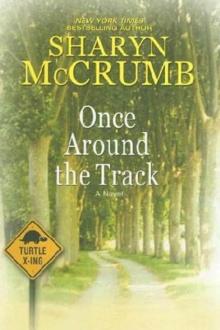 Once Around the Track
Once Around the Track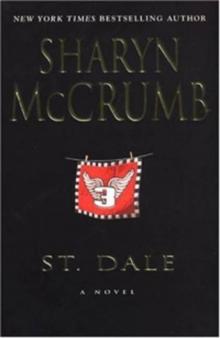 St. Dale
St. Dale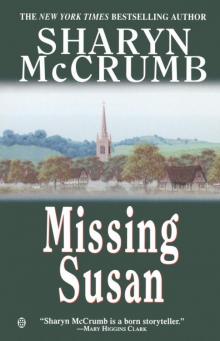 Elizabeth MacPherson 06 - Missing Susan
Elizabeth MacPherson 06 - Missing Susan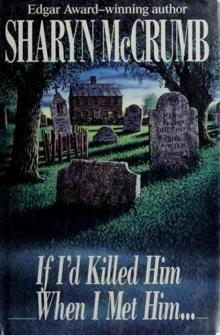 If I'd Killed Him When I Met Him…
If I'd Killed Him When I Met Him…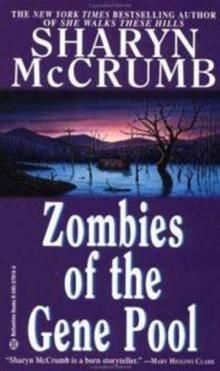 Zombies of the Gene Pool
Zombies of the Gene Pool Bimbos of the Death Sun
Bimbos of the Death Sun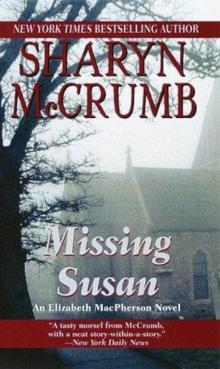 Missing Susan
Missing Susan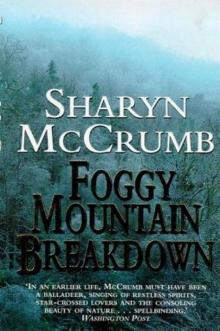 Foggy Mountain Breakdown and Other Stories
Foggy Mountain Breakdown and Other Stories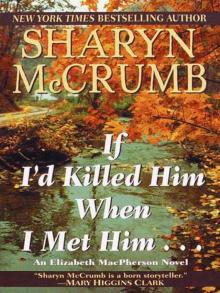 If I'd Killed Him When I Met Him
If I'd Killed Him When I Met Him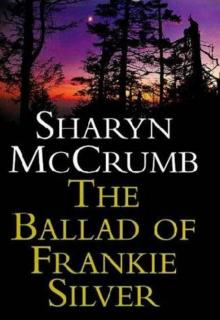 The Ballad of Frankie Silver
The Ballad of Frankie Silver Lovely In Her Bones
Lovely In Her Bones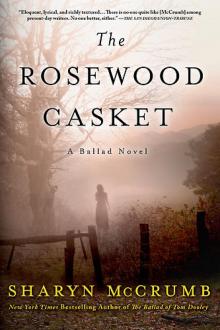 The Rosewood Casket
The Rosewood Casket King's Mountain
King's Mountain